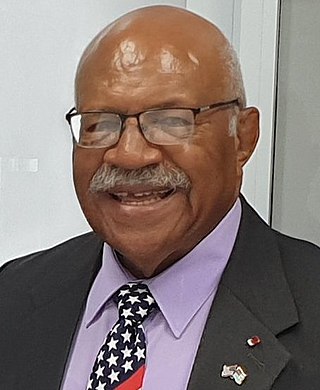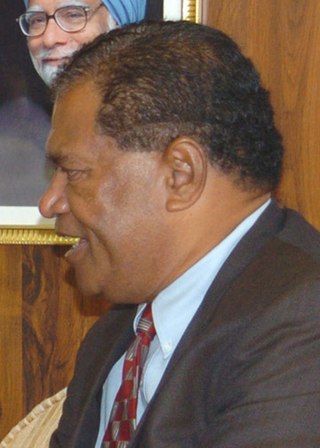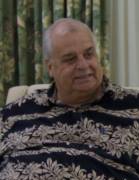Related Research Articles

Sitiveni Ligamamada Rabuka is a Fijian politician who has served as Prime Minister of Fiji since 24 December 2022. He was the instigator of two military coups in 1987. He was democratically elected as Prime Minister of Fiji, serving from 1992 to 1999, and again in 2022, leading a three-party coalition. He also served as Chairman of the Great Council of Chiefs from 1999 to 2001, and later as Chairman of the Cakaudrove Provincial Council from 2001 to 2008.

Tupeni Lebaivalu Baba is a Fijian academic, politician, and former Cabinet Minister. A founding member of the Fiji Labour Party, he served as a Cabinet Minister in the government of Timoci Bavadra until removed from office by the 1987 Fijian coups d'état, and then as Deputy Prime Minister of Fiji in the government of Mahendra Chaudhry until removed from office by the 2000 Fijian coup d'état. After splitting with Choudhry in the wake of the coup, he founded the New Labour Unity Party to contest the 2001 election, but failed to win a seat in Parliament. He unsuccessfully attempting to re-enter politics at the 2006 election under the banner of the Soqosoqo Duavata ni Lewenivanua, and again at the 2014 election as part of the Social Democratic Liberal Party.

Josaia Voreqe "Frank" Bainimarama is a Fijian politician and former naval officer who served as the prime minister of Fiji from 2007 until 2022. A member of the FijiFirst party, which he founded in 2014, he began his career as an officer in the Fijian navy and commander of the Fijian military. He served as the opposition leader from 24 December 2022 despite being suspended from Parliament until 8 March 2023, when he resigned and was replaced by Inia Seruiratu.

The Fiji coup d'état of 2000 was a civilian coup d'état by hardline i-Taukei nationalists against the elected government of an Indo-Fijian Prime Minister, Mahendra Chaudhry on 19 May 2000. This was followed by an attempt on 27 May by President Ratu Sir Kamisese Mara to assert executive authority, and then by a military coup on 29 May by Republic of Fiji Military Forces Commander Commodore Frank Bainimarama. The coups resulted in the removal of the elected government and its replacement by an interim regime headed by Josefa Iloilo. In March 2001 the Court of Appeal of Fiji ruled that the coups and interim regime were illegal. An elected government was finally restored by the 2001 Fijian general election.

Poseci Waqalevu Bune is a former Fijian civil servant, diplomat, politician and Cabinet Minister. He has served as chair of the Public Service Commissioner, secretary to the Prime Minister, and as Fiji's permanent representative to the United Nations, as well as a Cabinet Minister in the governments of Mahendra Chaudhry and Laisenia Qarase, and in the military regime of Frank Bainimarama.
Ratu Cokanauto Tu'uakitau is a Fijian chief and politician. He is the scion of a distinguished family, as a son of Ratu Sir Edward Cakobau, and brother of Ratu Epeli Nailatikau, who has served as President of Fiji since 2009.
Ratu Meli Bogileka is a Fijian politician. He was the Secretary of the People's National Party (PNP) up to its decision to merge into the Party of National Unity (PANU) on 5 March 2006. This merger, an affair complicated by several about-turns, saw Bogileka appointed Secretary of the new PANU..

Mick Malcolm Millis Beddoes, widely known as Mick Beddoes, is a Fijian politician and businessman from Nadi, who led the United Peoples Party from 2000 to 2013, and was the Leader of the Opposition at the time of the military coup of 5 December 2006. He was also the Chief Executive of the World Netball Company, and was Chairman of the organising committee for the 2007 World Netball Championships, but announced his resignation on 24 January 2006, citing a possible conflict of interest, as his company would be working as a ground operator during the championships.

Commodore Frank Bainimarama, Commander of the Republic of Fiji Military Forces, had been a vociferous and uncompromising critic of the government's proposal to establish a Reconciliation and Unity Commission, with the power to grant compensation to victims of the 2000 Fijian coup d'état, and amnesty to perpetrators of it. Among other objections, the Military claimed that its integrity and discipline would be undermined if soldiers who mutinied in the 2000 upheaval were to be pardoned.
Simione Kaitani is a former Fijian politician and Cabinet Minister in the government of Laisenia Qarase. He was tried for taking an illegal oath over the 2000 Fijian coup d'état in 2005, but acquitted. He later served as Leader of the House, until removed from office by the 2006 Fijian coup d'état.
Adi Asenaca Coboiverata Caucau, generally known simply as Adi Asenaca Caucau, is a Fijian politician. She served as Minister For Women and Minister for Social Welfare and Poverty Alleviation from 2001 to 2006, when she became Minister of State for Housing. She held this post, and continued to represent the Tailevu South Lomaiviti Open Constituency in the House of Representatives until 5 December 2006, when the Military of Fiji staged a coup d'état and removed her government from office. She had first won the seat for the Soqosoqo Duavata ni Lewenivanua Party (SDL) in the parliamentary election of September 2001.
Samisoni Tikoinasau Speight, also known as Sam Speight Jr is a Fijian politician, who held Cabinet office as Minister of State for Public Utilities and Reforms, to which he was appointed after the 2006 election. Previously, he was Minister for Lands and Mineral Resources from 2005 to 2006. Like many ethnic Fijians, he rarely uses his surname.

General elections were held in Fiji between 6 and 13 May 2006.
Lesi Korovavala is a former Fijian civil servant, who served as the chief executive officer of the Ministry for Home Affairs.

The tension between Fiji's government and military forces, which had been simmering for more than two years, appeared to escalate in late December 2005. Tension between the government and the military had been simmering throughout the year, with Commodore Bainimarama and other military officers making strongly worded public statements opposing certain government policies, including the early release from prison of persons implicated in the Fiji coup of 2000, and the government's promotion of controversial legislation to establish a Commission with the power to grant amnesty to perpetrators of the coup.

The crisis that saw a virtual breakdown in relations between Fiji's government and military forces in late 2005 and early 2006, generated fears of civil unrest and even a military coup. The dismissing of Lieutenant Colonel Jone Baledrokadroka, the Acting Land Force Commander, for alleged insubordination on 12 January 2006 was coupled with unusual deployments of troops and naval vessels. Both before and after it was resolved on 16 January with a truce brokered by Acting President Ratu Joni Madraiwiwi, the crisis generated a great deal of comment.

Elections to the offices of President and Vice-President of Fiji took place on 8 March 2006, when the Great Council of Chiefs met as an electoral college at the Tradewinds Convention Centre in Lami. The Great Council re-elected President Ratu Josefa Iloilo and Vice-President Ratu Joni Madraiwiwi to another five-year term.

The Fijian coup d'état of December 2006 was a coup d'état in Fiji carried out by Commodore Frank Bainimarama, Commander of the Republic of Fiji Military Forces (RFMF), against Prime Minister Laisenia Qarase and President Josefa Iloilo. It was the culmination of a political crisis that started the previous year, when the Qarase government introduced three bills to the Fijian Parliament. The Qoliqoli, Land Tribunal, and Reconciliation, Tolerance, and Unity Bills dealt with the ongoing ethnic conflicts in Fiji and the aftermath of the 2000 coup, and were considered to be pro-ethnic Fijian. Bainimarama presented the government with a list of demands on October 16 that included withdrawing the bills. Attempts at negotiation failed and the military launched the coup on 4 December. Parliament was dissolved, Qarase and his cabinet were dismissed, and some civilian officials were placed under house arrest. After the Great Council of Chiefs refused to appoint a cabinet friendly to the military, Bainimarama reached an understanding with Iloilo and reinstated him as President on 4 January 2007. Iloilo then appointed Bainimarama acting Prime Minister in charge of the Interim Cabinet.

Ratu Josefa Iloilovatu Uluivuda, was a Fijian politician who served as the 3rd President of Fiji from 2000 until 2009, excluding a brief period from 5 December 2006 to 4 January 2007. He held the traditional title of Tui Vuda, the paramount chief of the Vuda district in Ba Province on Fiji's northwest coast. Like many Fijian people, he rarely used his surname and was known simply as Josefa Iloilo. He announced on 28 July 2009 that he would be leaving office on 30 July. At the age of 88, he was the world's oldest head of state.

Lt Col Pio Tikoduadua is a Fijian politician, cabinet Minister and Member of the Parliament of Fiji. He is the current President of the National Federation Party.
References
- 1 2 "Vosanibola picks up mantle from father". Fiji Sun. 20 November 2018. Retrieved 22 February 2023.
- ↑ Frenḳel, Yehonatan Shimʻon; Fraenkel, Jon; Firth, Stewart (2007). From election to coup in Fiji: the 2006 campaign and its aftermath. ANU E Press. p. 126. ISBN 978-0-7315-3812-6 . Retrieved 21 January 2011.
- ↑ Firth, Stewart; Fraenkel, Jon (April 2009). The 2006 military takeover in Fiji: the coup to end all coups?. ANU E Press. p. 29. ISBN 978-1-921536-50-2 . Retrieved 21 January 2011.
- ↑ Eur (2002). Far East and Australasia 2003. Psychology Press. p. 990. ISBN 978-1-85743-133-9 . Retrieved 21 January 2011.
- ↑ "Fiji home affairs minister warns military commander". RNZ. 19 April 2005. Retrieved 4 March 2023.
- ↑ "Fiji military commander vows to continue to speak out on important issues". RNZ. 20 April 2005. Retrieved 4 March 2023.
- ↑ "Fiji president declines to suspend military commander". RNZ. 10 June 2005. Retrieved 4 March 2023.
- ↑ "Fiji army commander calls for resignation of minister". RNZ. 11 July 2005. Retrieved 4 March 2023.
- ↑ "Fiji military move to evict home affairs chief executive from his office". RNZ. 28 December 2005. Retrieved 4 March 2023.
- ↑ "Fiji minister in emergency meeting following military's takeover threat". RNZ. 28 December 2005. Retrieved 4 March 2023.
- ↑ "Fiji military commander calls on government to resign". RNZ. 4 January 2006. Retrieved 4 March 2023.
- ↑ "Fiji cabinet sworn in". RNZ. 23 May 2006. Retrieved 22 February 2023.